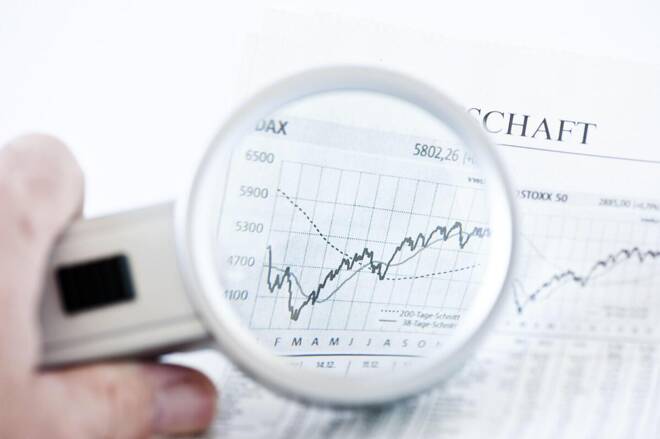Advertisement
Advertisement
DAX Index: German Inflation, Economic Sentiment, and the ECB in Focus
By:
Recessionary fears and hawkish ECB commentary could fuel further DAX losses as investors grapple with rising geopolitical tensions.
Highlights
- The DAX declined by 0.49% on Monday, ending the session at 16,622.
- ECB warnings against bets on a 2024 ECB rate cut and German economic indicators left the DAX in negative territory.
- On Tuesday, the ECB, German inflation, and ZEW Economic Sentiment figures will draw investor interest.
Overview of the DAX Performance on Monday
The DAX declined by 0.49% on Monday. Partially reversing a 0.95% gain from Friday, the DAX ended the session at 16,622.
ECB Officials Overshadow Euro Area Economic Indicators
On Monday, the German and Eurozone economies were in the spotlight. German wholesale prices fell by more than forecast. However, GDP numbers aligned with the forecast. The German economy contracted by 0.3% in Q4 2023. German wholesale prices fell by 0.6% in December. Economists forecast a 0.3% decline.
In November, industrial production across the Eurozone fell by 0.3%, aligning with forecasts. However, the Eurozone trade surplus widened from €11.1 billion to €20.3 billion.
The economic indicators from Germany impacted buyer demand for DAX-listed funds. Geopolitical risks and concerns about the timing of an ECB interest rate cut also influenced. On Monday, ECB Governing Council member Robert Holzmann warned against bets on a 2024 ECB rate cut.
There were no US economic indicators to influence market risk sentiment. The US markets were closed for Martin Luther King Jr Day.
The Monday Market Movers
Recessionary jitters impacted consumer-related stocks. Zalando SE and Adidas saw losses of 2.77% and 1.05%, respectively. Rising government bond yields in response to hawkish ECB comments weighed on tech stocks. Infineon Technologies and Siemens Energy AG ended the day down 1.34% and 2.57%, respectively.
However, auto stocks had a mixed session despite the doom and gloom. BMW and Volkswagen fell by 1.37% and 0.45%, respectively. Porsche and Mercedes-Benz Group bucked the broader market trend, gaining 0.56% and 0.10%, respectively.
German Inflation, Economic Sentiment, and the ECB in Focus
On Tuesday, the German economy will be in focus. Finalized German inflation numbers will garner investor interest early in the European session. Upward revisions to the preliminary figures could spook investors after recent ECB comments on interest rates. According to preliminary numbers, the annual inflation rate accelerated from 3.2% to 3.7% in December.
ZEW Economic Sentiment figures for Germany and the Eurozone also need consideration. Larger-than-expected declines in the headline numbers could impact buyer demand for DAX-listed stocks. Economists expect the German ZEW Economic Sentiment Index to fall from 12.8 to 12.0 in January. Economists predict the Eurozone ZEW Economic Sentiment Index to fall from 23.0 to 21.9.
There are increasing concerns the German economy could drag the Eurozone economy into a recession.
Beyond the numbers, investors must also monitor ECB commentary. ECB Vice-President Luis de Guindos is on the calendar to speak on Tuesday.
The US Manufacturing Sector and Fed Chatter
On Tuesday, the US manufacturing sector will be in focus after the Monday holiday. Economists forecast the NY Empire State Manufacturing Index to increase from -14.5 to -5.0 in January. An improving manufacturing sector environment would support expectations of a soft landing.
However, investors must also consider FOMC member commentary. FOMC member Christopher Waller is on the calendar to speak. Comments on inflation and interest rates would move the dial.
Beyond the economic calendar, US bank earnings will move the dial. Morgan Stanley (MS) and Goldman Sachs (GS) will release earnings results on Tuesday.
Short-Term Forecast
Near-term DAX trends will hinge on German inflation and central bank commentary. Sticky inflation and hawkish ECB comments could impact buyer demand for DAX-listed stocks. However, investors must also consider Fed speeches and geopolitical risks.
DAX Technical Indicators
Daily Chart
The DAX held above the 50-day and 200-day EMAs, sending bullish price signals.
A DAX break above the January 11 high of 16,840 would support a move toward the DAX all-time high (AHT) of 17,003.
The German economy and central bank commentary remain focal points.
However, a fall through the 16,470 support level would bring the 50-day EMA and 16,290 support level into view.
The 14-day RSI reading of 53.58 suggests a DAX return to the 17,000 handle before entering overbought territory.
4-Hourly Chart
The DAX hovered below the 50-day EMA while holding above the 200-day EMA, sending bearish near-term but bullish longer-term price trends.
A DAX break above the 50-day EMA would support a move to the January 11 high of 16,840. A move through the January 11 high would bring the ATH of 17,003 into view.
However, a drop below the 16,600 handle would bring the 16,470 support level into play.
The 47.45 14-4 hour RSI suggests a DAX fall to the 16,470 support level before entering oversold territory.
For a look at the economic events, check out our economic calendar.
About the Author
Bob Masonauthor
With over 28 years of experience in the financial industry, Bob has worked with various global rating agencies and multinational banks. Currently he is covering currencies, commodities, alternative asset classes and global equities, focusing mostly on European and Asian markets.
Advertisement
